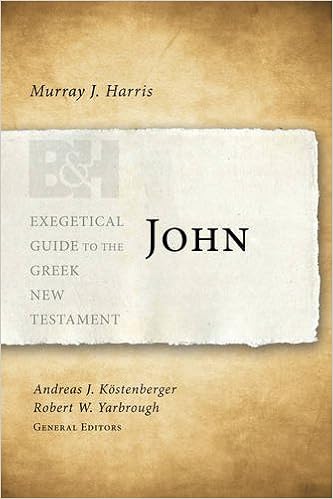 Exegetical Guide to the Greek New Testament: John by Murray J. Harris; series editors Andreas J. Kostenberger and Robert W. Yarbrough; 2015 from B&H Academic, Nashville; 366 pgs, softcover, $34.99.
Exegetical Guide to the Greek New Testament: John by Murray J. Harris; series editors Andreas J. Kostenberger and Robert W. Yarbrough; 2015 from B&H Academic, Nashville; 366 pgs, softcover, $34.99.
Why did you study Greek in seminary or college? Most of us would claim it was to better understand the Word of God. Yet for too many of us, our Greek usage in everyday Bible study is a few word studies and recognizing what an “aorist” is when we read an English-language commentary. These commentaries are often based on an English translation and then comment on how the translation is either helpful or needs improvement.
The Exegetical Guide to the Greek New Testament (EGGNT) series finds its niche by focusing on the actual Greek New Testament rather than a translation. Yes, for those who would quibble, it’s actually based on the UBS5 version of the Greek text. Therefore, rather than address translation adequacies and inadequacies, the authors are able to focus on the grammar and structure of the original.
Murray J. Harris, who authored the EGGNT volume John, was the originator of this series that is now published by B&H Academic. Harris was trained by some of the foremost scholars of the twentieth century until he became one of them, and his insights are not only academic but also pastoral and filled with the wisdom of long service to the Lord Jesus.
Taking the EGGNT:John volume separately from the series, the following items should be noted. First, while the other volumes in this series contain the Greek text, this one does not. While this move saved space and produced a single-volume work, it does require that the reader supply the Greek text. The work is based, as stated, on the UBS5 text which was released in 2014. This may be a drawback to some readers, yet it should not be.
Second, readers of the EGGNT:John volume will realize the benefit of improving their old Greek skills. Rather than fleeing from this Greek-based commentary out of fear of rust, readers will begin to see the Greek become easier to work with. Further, readers will better see the context of various Greek terms. True, one will still need a bit of vocabulary help, but seeing the insight from Greek will improve the overall use of Greek by the preacher or teacher.
Finally, Harris’ overall insights are valuable for the preacher and teacher. His brief overview of the background for John is helpful, including explaining some of the basis for the traditional understandings of authorship. His explanations of the textual structure provide guidance for teaching, and his homiletical suggestions are almost too useful for the hurried preacher—use your own skills, do not just copy his!
Anyone seeking a better understanding of the Gospel of John will benefit from Harris’ work on the Exegetical Guide to the Greek New Testament: John.
This review first appeared in the Arkansas Baptist Newsmagazine.


No comments:
Post a Comment
To deal with SPAM comments, all comments are moderated. I'm typically willing to post contrary views...but I also only check the list once a day, so if you posted within the last 24 hours, I may not be to it yet.